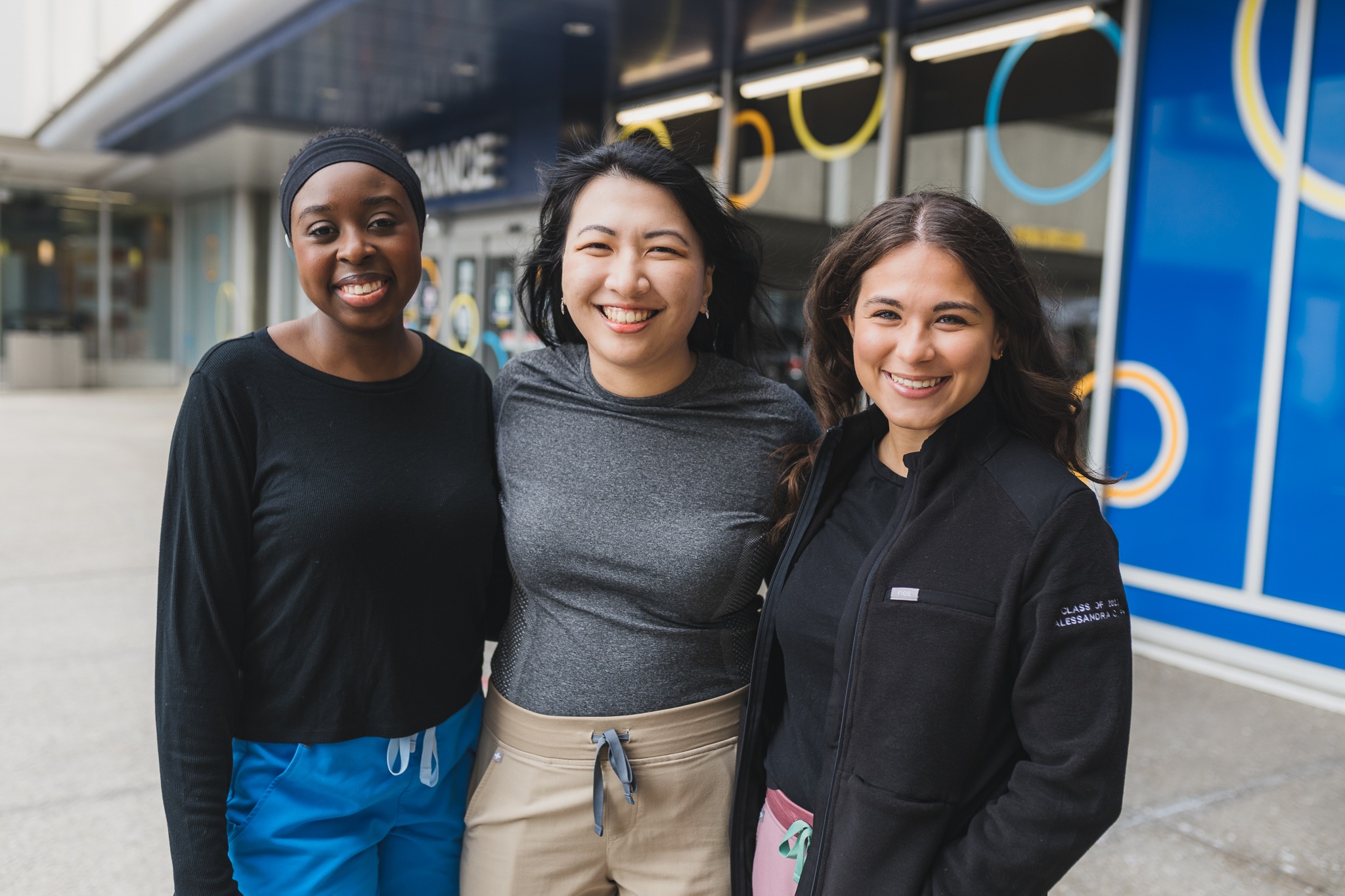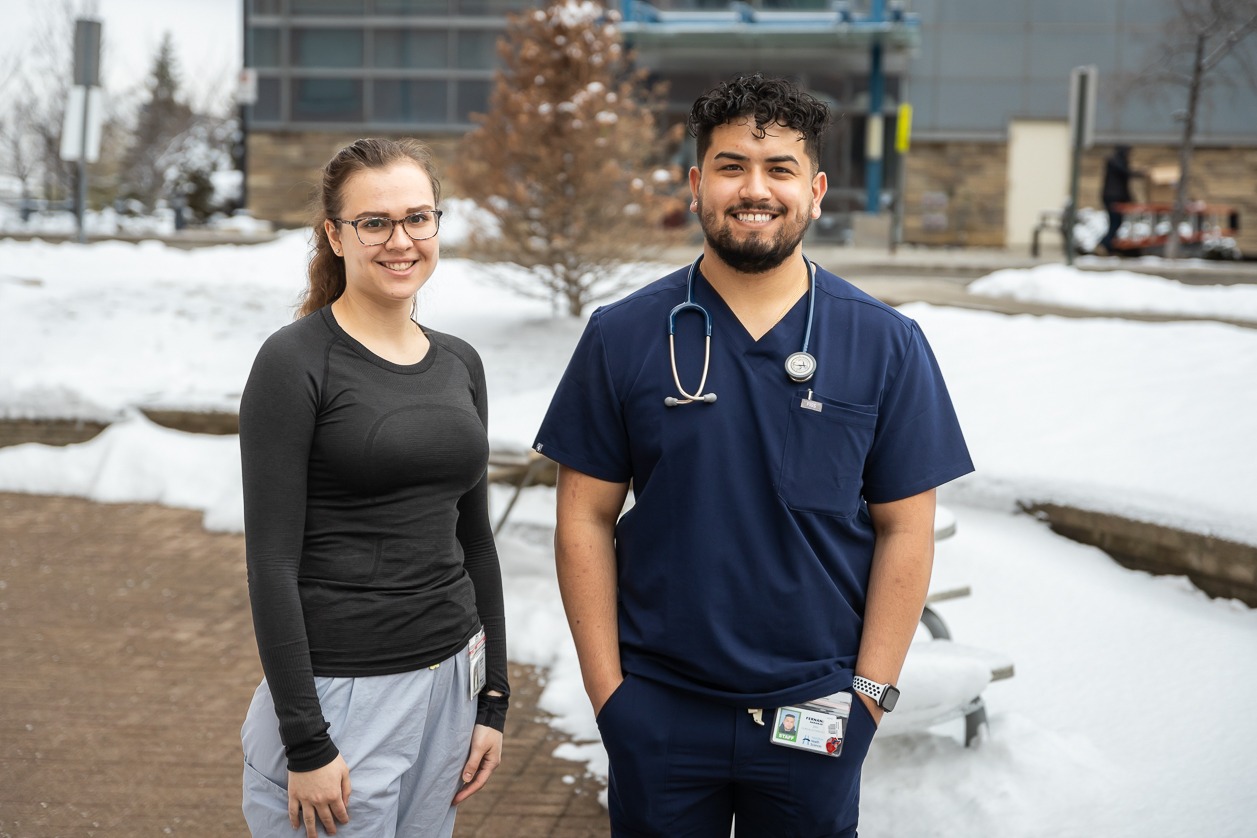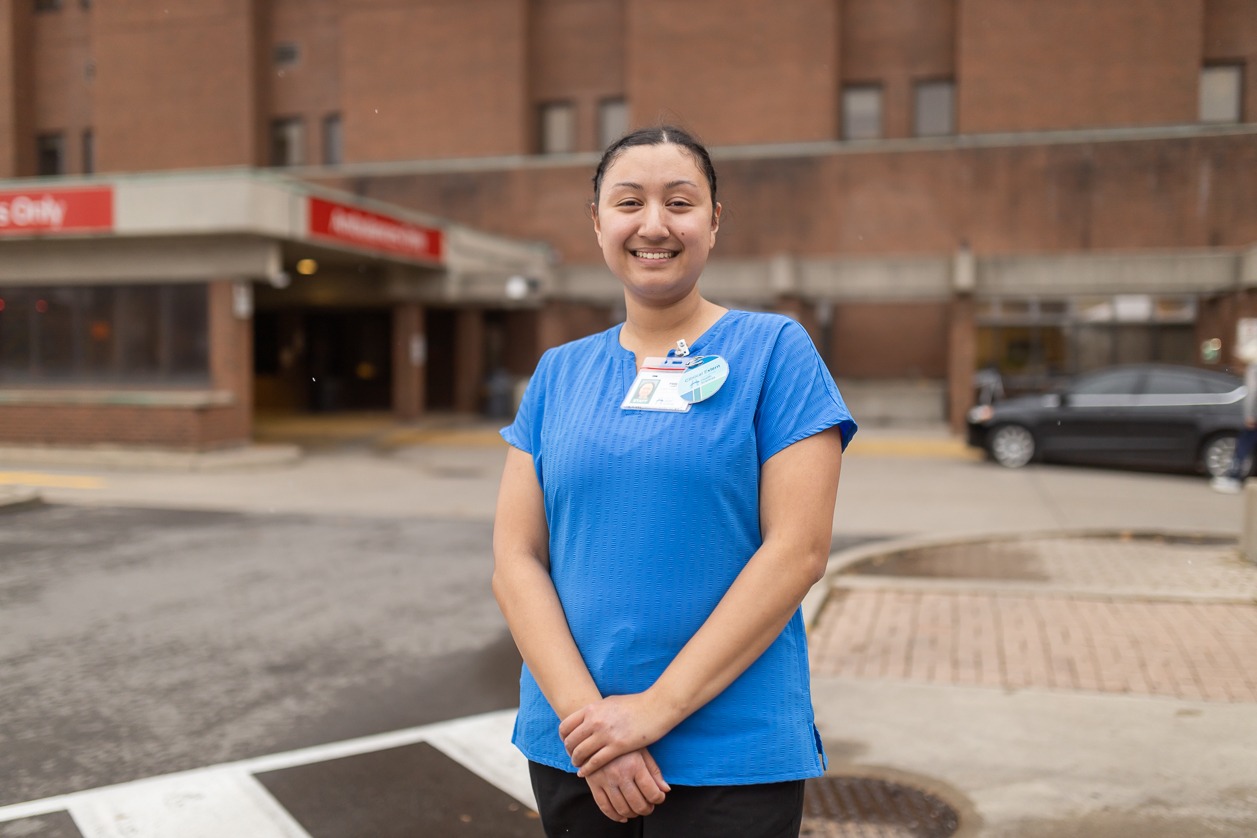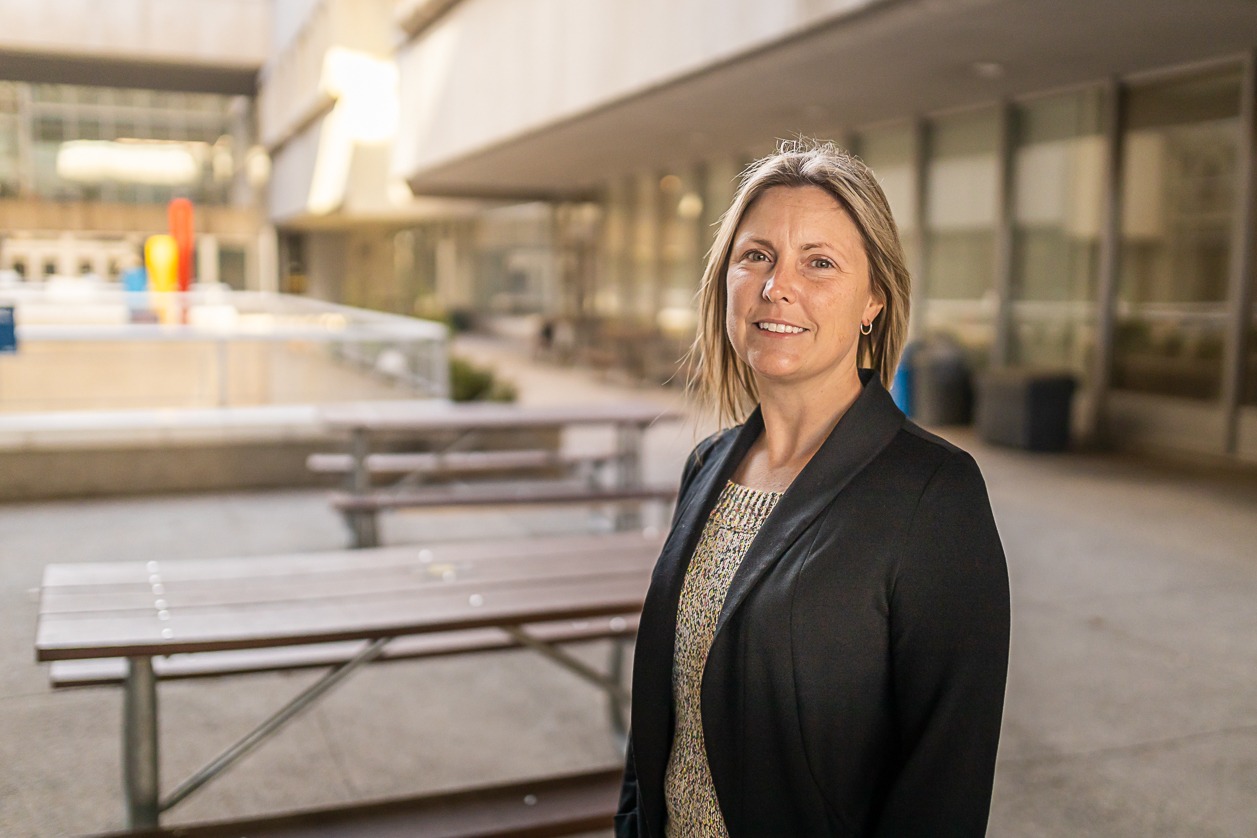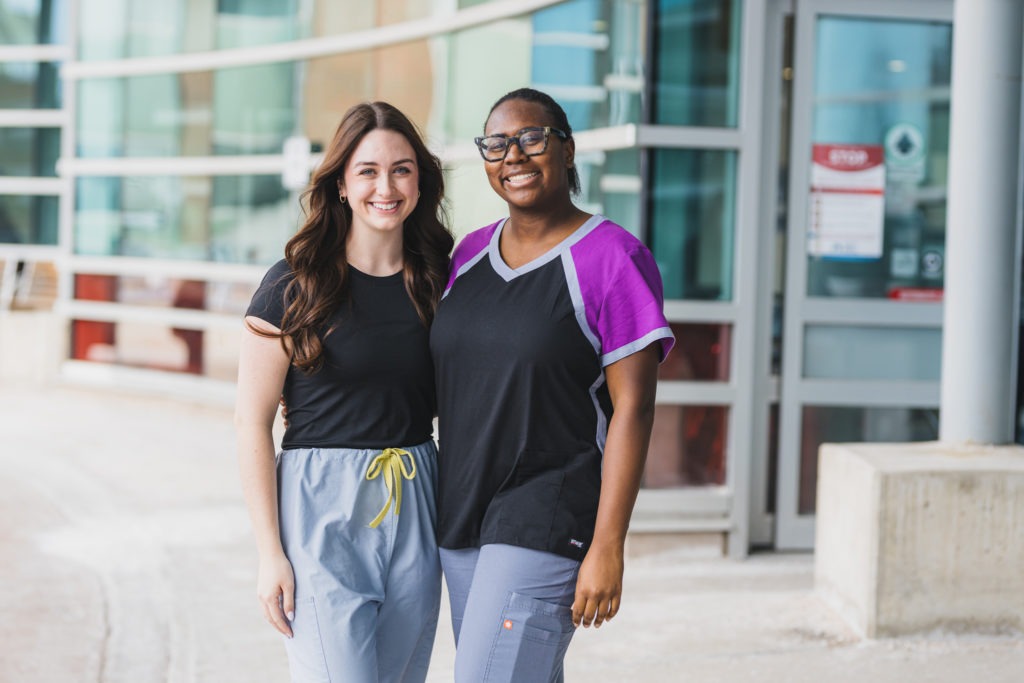
Mother, aunt, grandmother inspire HHS nursing careers
Staffing shortages triggered by the pandemic continue to impact hospitals across the province, including Hamilton Health Sciences (HHS). One of the innovative ways that HHS is addressing shortages is through the provincially-funded clinical extern program, created by the province to provide additional health-care support to hospitals. Senior university and college students in nursing, occupational therapy, respiratory therapy, physiotherapy and paramedic programs can apply to work at HHS hospital sites as clinical externs. They work at least one shift per week, with a typical shift being eight to 12 hours.Health Care: The Next Generation
Inspired by family
Myiah Sloss was motivated to pursue a career in nursing after seeing her mother and aunt go through breast cancer treatment.
“My mom and my aunt are both breast cancer survivors.” says Sloss, a fourth-year student in the McMaster-Mohawk-Conestoga bachelor of science in nursing program offered at Mohawk College, and a clinical extern at HHS’ Juravinski Hospital and Cancer Centre (JHCC).
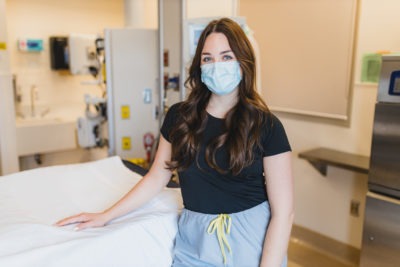
Nursing student Myiah Sloss works as an extern in the intensive care unit (ICU) at our Juravinski Hospital and Cancer Centre.
“Seeing my mom’s health-care team in action was inspiring,” says Sloss, 22, of Ancaster. “It has given me two perspectives — one as a family member and one as a nurse. I believe this has helped me relate better to the patients I work with as an extern at Hamilton Health Sciences. Many are cancer patients, so having background knowledge and a personal connection to cancer helps me when providing care, and during tough discussions with family members.”
“I love helping and caring for others, and hopefully seeing improvements in the patient’s outcome.” — Myiah Sloss, nursing student and extern
As well as finishing her final year of nursing school, Sloss works as an extern in the intensive care unit (ICU) at JHCC. She started as an extern in February 2022 and hopes to join the hospital’s ICU team once she graduates later this month.
Extra hands-on-deck
While externs aren’t registered health-care professionals yet, they make significant contributions by helping with tasks they’re allowed to perform as unregulated care providers such as bathing, personal hygiene care, dressing, eating, mobilization, and companionship and support for patients and their families.
Externs can also complete other tasks, depending on their area of care and patient population, when delegated by a regulated health-care professional. These tasks can include capillary blood glucose testing, nasopharyngeal/nasal/rectal swabbing, and removal of peripheral IV and urinary catheters.
“I’m constantly gaining new skills due to the variety that is present in the emergency department.” — Taejah Roberts, nursing student and HHS extern
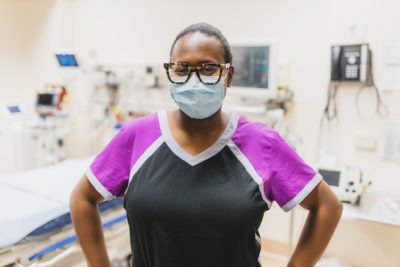
Taejah Roberts works as an extern in Juravinski Hospital’s emergency department.
Staff welcome the extra hands-on-deck, and students gain valuable work experience at HHS, recognized for the second year in a row as one of Canada’s top employers for young people.
“ICU patients sometimes stay in hospital for long periods of time, so their health-care team gets to form relationships with them as well as their family members,” says Sloss, who finds this especially rewarding. “I love helping and caring for others, and hopefully seeing improvements in the patient’s outcome.”
Back when Sloss applied to be an extern, she was especially interested in oncology and pediatric care. “I always thought that I’d want to work with children, but I’ve fallen in love with the ICU,” she says. “I find working with this patient population to be highly rewarding, and the staff here are very supportive. I’m hoping to work in the Juravinski ICU once I graduate.”
Building valuable skills
McMaster nursing student and JHCC extern Taejah Roberts was also inspired to pursue this career path by a family member. “My grandmother spent quite a bit of time in hospital, and I was really impressed by the way the nurses interacted with her,” says Roberts, a 20-year-old Mississauga resident who’s in her third year of nursing and will graduate in 2024.
“The care that was provided to my grandmother was very inspiring, and I thought to myself, `I want to do that for people one day.’”
Roberts works as an extern in JHCC’s emergency department. “I thrive in busy, fast-paced environments where every day brings something new and challenging. I’m constantly gaining new skills due to the variety that is present in the emergency department.”
She strongly recommends the extern program to any health-care student that qualifies. “People who apply are given a list of openings, and can apply to work in areas that they’re most interested in,” she says, adding, “Although they try to give you your top choice, this is not always guaranteed. However, regardless of where externs are placed, it’s an amazing opportunity to connect with other health-care professionals and gain experience.”
More about our clinical extern program
This program has continued to grow over the past two years, bringing even more potential health-care workers to HHS.
- Since launching the clinical extern program in early 2021, HHS has hired 126 nursing clinical externs as registered nurses and registered practical nurses after they graduated, as well as seven respiratory therapy externs as registered respiratory therapists.
- As of February, HHS had 200 nursing externs, 12 occupational therapy externs, 10 respiratory therapy externs, five paramedic externs, and three physiotherapy externs.
- Our externs work at Hamilton General Hospital, the Regional Rehabilitation Centre, Juravinski Hospital and Cancer Centre, McMaster University Medical Centre, McMaster Children’s Hospital, West Lincoln Memorial Hospital, St. Peter’s Hospital, the Satellite Health Facility and the Virtual Nursing Station.
- The majority of HHS externs are from McMaster University and Mohawk College, as well as Brock University, Niagara College, Western University, Fanshawe College, and Toronto Metropolitan University. A few are from further afield, such as the University of Ottawa, University of Windsor and Laurentian University in Sudbury.
- 81 nursing externs are expected to graduate in April, along with nine respiratory therapy externs. In August, 11 occupational and physiotherapy externs will graduate. Most graduates choose careers at HHS. For those who don’t, it’s typically because they’re returning to their hometowns to work.
This story is part of a series featuring students gaining hands-on experience at HHS.

